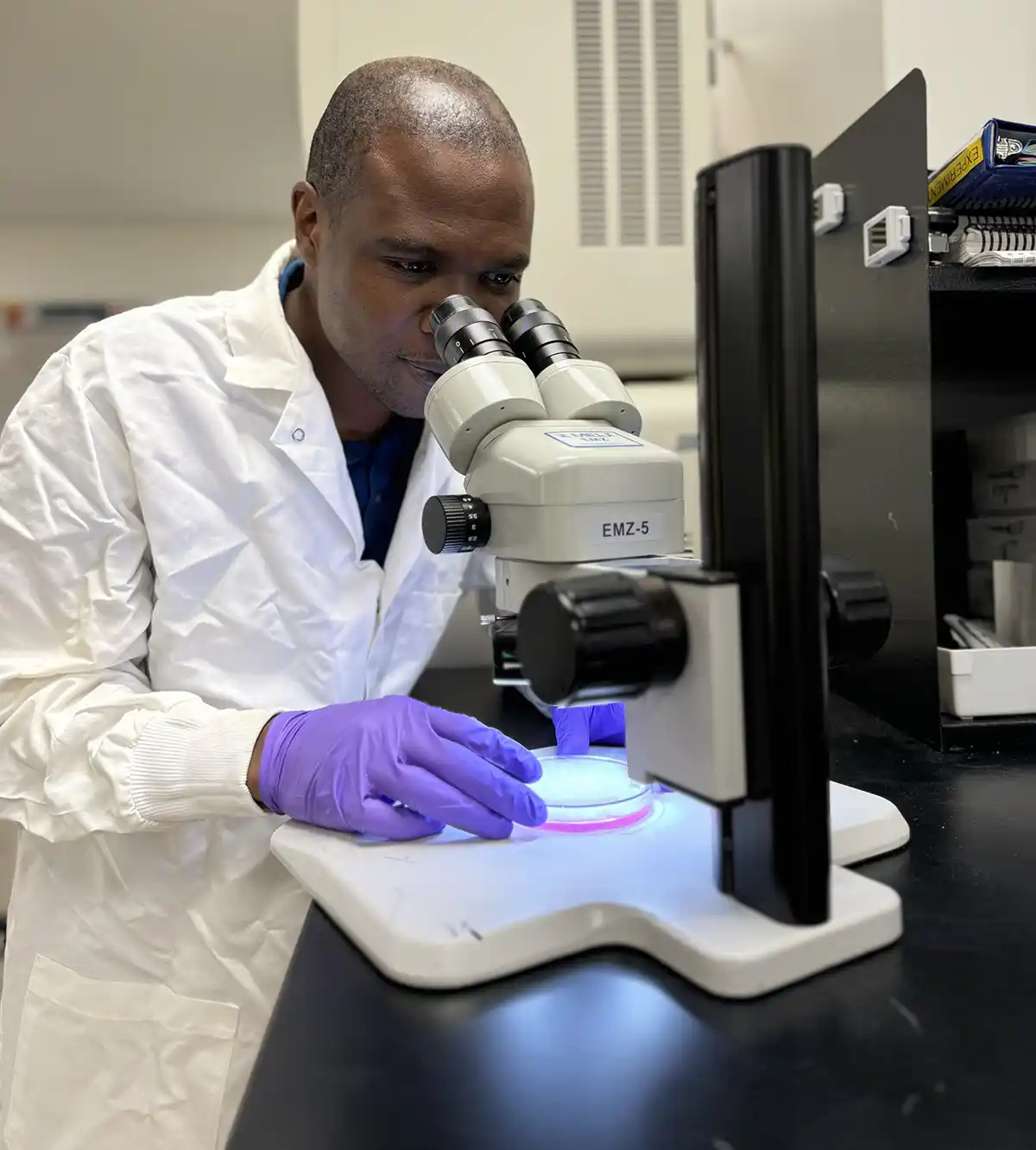USDA fellow researches mitigating fungal infections in Texas corn
Meet Connel Ching’anda

Connel Ching’anda, Ph.D., performs research with the U.S. Department of Agriculture’s Arid Land Agricultural Research Center in Maricopa, Arizona. (Photo Credit: Dakota Salyer)
During his childhood, Connel Ching’anda, Ph.D., had a curiosity to understand how things worked. This curiosity was motivated by his older brother, who studied biology. Ching’anda was inspired by the challenges faced by farmers in the Republic of Malawi, a country in Southeastern Africa.
“Growing up in Malawi, I have seen firsthand how farmers struggle to produce enough food for themselves as well as crops that would meet international export standards due to crop pests and diseases,” he says.
Ching’anda chose the STEM career path because he wanted to contribute to solving these global challenges. He studied food science while earning his bachelor’s degree in environmental science at the University of Malawi and sought to understand plant diseases and ways of mitigating them for crop safety.
After completing his Ph.D. in plant pathology at the University of Arizona, Ching’anda heard about the Oak Ridge Institute for Science and Education (ORISE) at a scientific conference where an ORISE participant was presenting their research.
“I followed up by searching for the program online, and I learned how the program prepares the next generation of scientists through internships and postdoc fellowships,” he explains. “Since graduation, I kept an eye on the program and when the opportunity was posted with the USDA (U.S. Department of Agriculture), I knew it was time to advance my career.”
Ching’anda currently researches with the U.S. Department of Agriculture Agricultural Research Service (ARS) Arid Land Agricultural Research Center in Maricopa, Arizona.
The USDA ARS Research Participation Program provides opportunities for students, postgraduates, established scientists and faculty to participate in programs, projects and activities at ARS-designated facilities to help ARS solve agricultural problems of high national priority.
Ching’anda’s research, in collaboration with his mentor Hillary Mehl, Ph.D., is focused on mitigating aflatoxin contamination in Texas corn.
“Aflatoxins are toxic fungal metabolites produced by Aspergillus flavus and other related species that contaminate crops and make them unsafe for human or animal consumption,” he explains. “Due to food safety regulations, contaminated crops are rejected by markets and farmers bear a huge economic cost.”
Ching’anda’s research project is focused on comparing the performance of different commercial biocontrol products that mitigate aflatoxin contamination of Texas corn.
“A better understanding of the performance of these products will help farmers make informed aflatoxin management decisions and will improve the formulation of future products,” he says. “This means farmers will be able to use biocontrol products more effectively to make our food systems safer.”
Ching’anda’s research has given him many opportunities for personal and professional growth.
“I have had the opportunity to travel across remote towns in Texas where corn is cultivated, and I appreciate how farmers work to feed the nation,” he says. “I have also developed my technical skills using cutting-edge equipment, and my communication skills through several poster and oral presentations.”
Overall, Ching’anda has found his research experience to be extremely enriching.
“The technical skills that I’ve gained by conducting large-scale field research and the opportunities to network have been invaluable experiences that will help me to succeed in my further endeavors as a scientist.”
His team is planning to publish his data in journals this year, and Ching’anda will be presenting his research at a seminar at the University of Arizona in February and at the APS Pacific Division conference in March.
After completing this research program, Ching’anda hopes to find a position in the public or private sector, continuing his research.
When asked about his favorite part of the program, Ching’anda praises the mentorship he has received throughout his appointment.
“I’ve really enjoyed the opportunity to be mentored by a leading scientist while pursuing my research and having access to state-of-the-art resources.”
The USDA ARS Research Participation Program is funded by USDA and is administered through the U.S. Department of Energy’s (DOE) Oak Ridge Institute for Science and Education (ORISE). ORISE is managed for DOE by ORAU.

